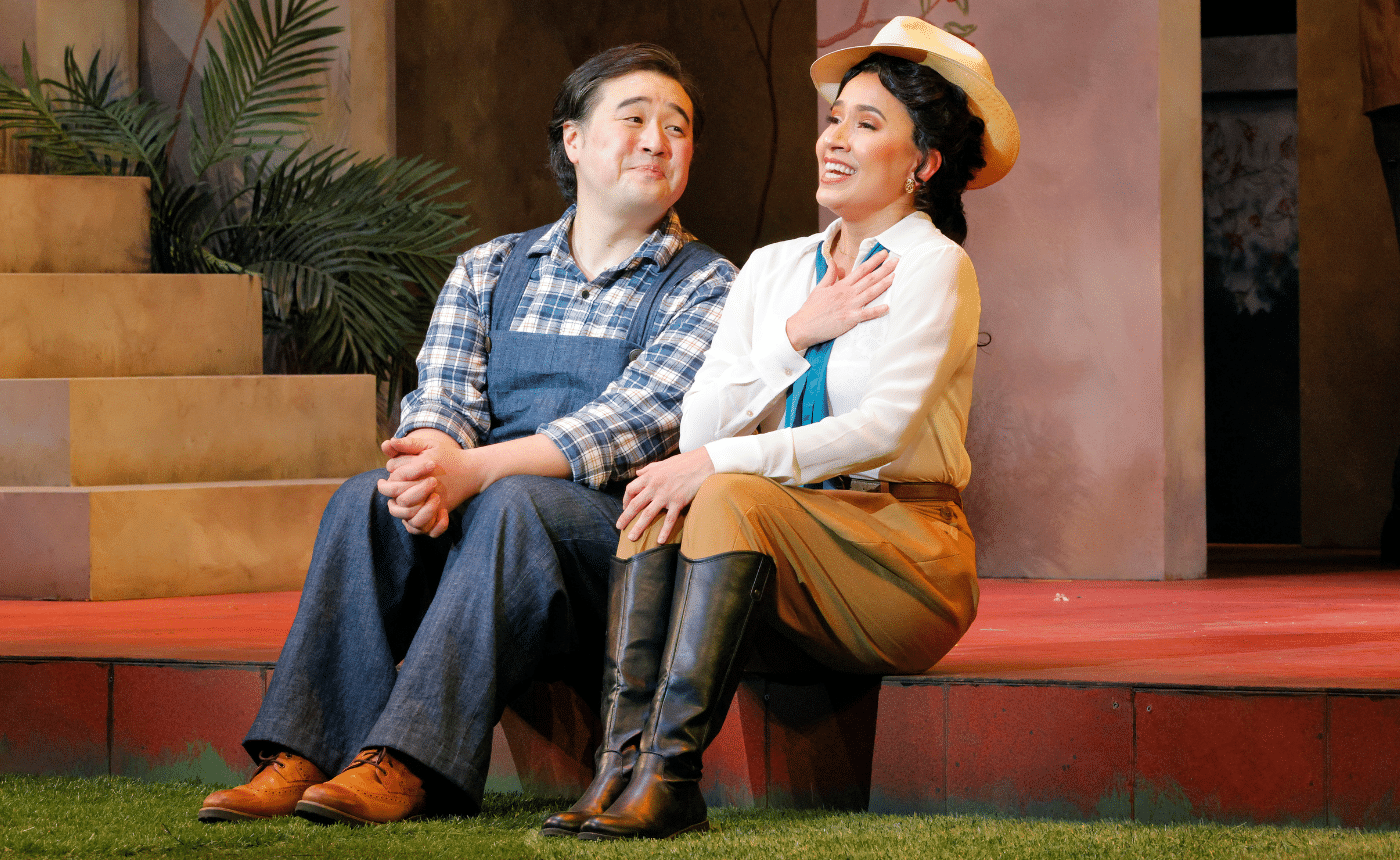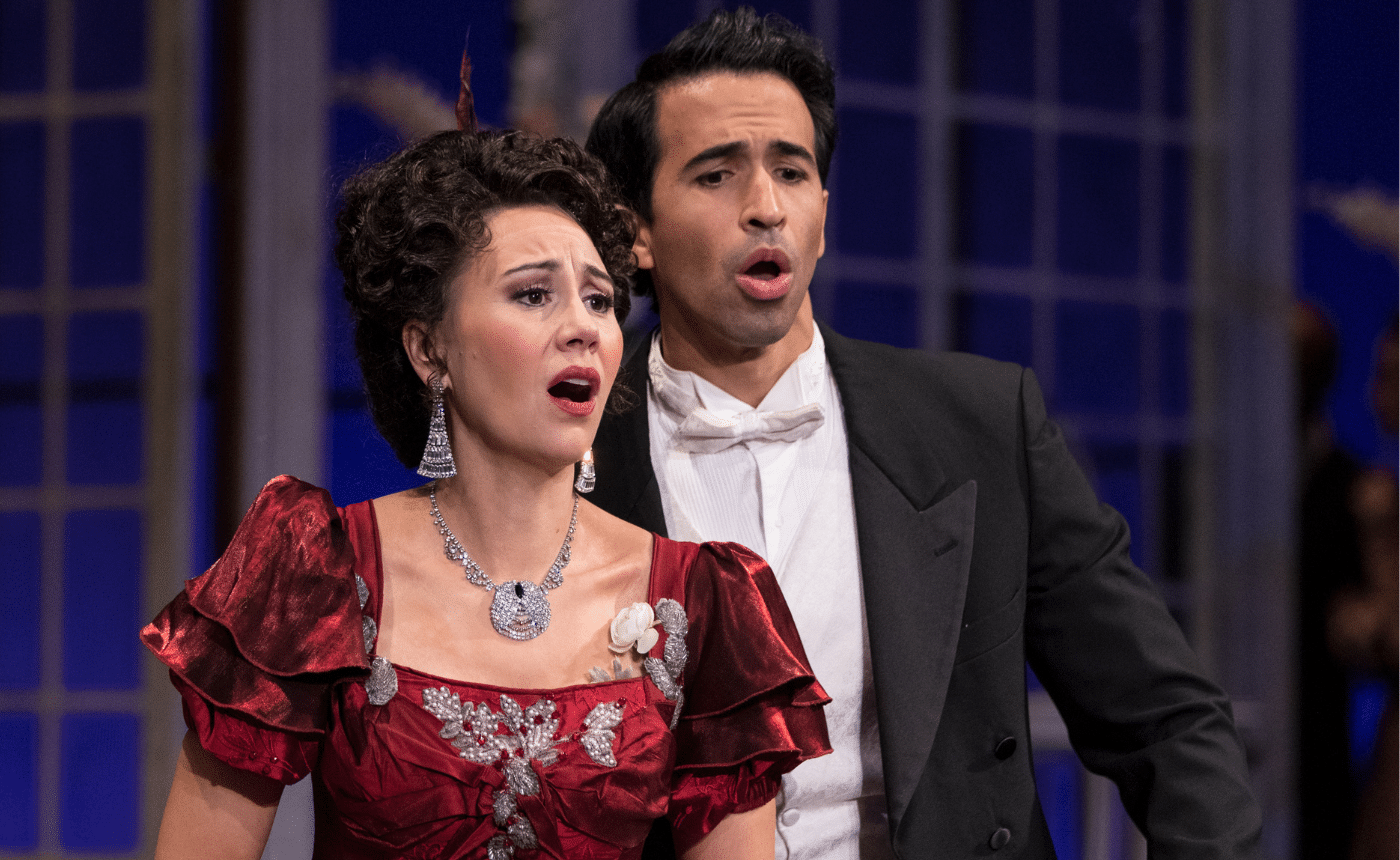Carmen: The Musical Story – Act 3
Act 3
Another “Entr’acte,” this one most beautiful. Initially harp arpeggios support a flute melody. Strings join to accompany a duet between the clarinet and flute, which resolves into a repeat of the melody played by English Horn and Bassoon, with a counter melody from First Violins and Violas. And with various winds playing the theme, accompanied by various counter-melodies from the strings, the end arrives. Glorious music, but you have to wonder what it introduces, since Act 3 begins with two blasts of a horn call, which may be a signal that all is clear. We are in a wild, rocky, deserted mountain place. The original libretto says that one Gypsy appears, then another, then lots of them; the men carry huge bundles on their shoulders.
A solo Flute, accompanied by plucked violas and cellos, announces a theme which will be taken over by the violins, and then, varied, by the entire wind section, which expands to include the full orchestra and then quiets down to allow the chorus to be heard. Perhaps the various instrumental entrances of the musical theme are Bizet’s way of observing the stage direction. “Be careful,” they warn each other, “a fortune waits down there, but watch your step: the path is dangerous.” Glorious Bizet! The six principals now sing, accompanied by the winds, a song of joy to their trade: it’s a good business, but it requires courage, for danger is everywhere; but we’re not afraid of the soldiers who are waiting down there to stop us. Repeat of the opening chorus.
Dancaïre tells the group that he needs to check out how to smuggle their stuff into town: there is a breach in the walls, but apparently a guard has been posted there. José says that Pastia claims the guard is one of theirs, but Dancaïre wants to make sure for himself. He drags the reluctant Remendado along with him.
While the gypsies settle down for the night, José apologizes to Carmen for being angry, but she won’t accept that: I know that I love you less than before; and if you continue like this I won’t love you at all. I won’t be ordered around: I must be free to do as I please. You’re a devil! Silence. What are you looking at, what are you thinking, she asks. Somewhere down there is a village where lives an old woman who still thinks I’m an honest man: my mother. Go back to her: you’re not made for our kind of life. You don’t know how to protect yourself; you’ll be killed. You too, if you won’t behave as I want you to. You’ll kill me? I’ve seen it often in the cards that we will die together. She moves over to Frasquita and Mercédès who have dealt cards to tell their fortunes. Violas are very busy here while woodwinds have a lot of fun commenting on their various choices.
The vocal score is confused in identifying which girl reads what in the cards; but, since Frasquita is the soprano and Mercèdés the mezzo, the vocal lines solve that problem. Mercèdès sees a young man who is madly in love with her, while Frasquita sees a rich old man who wants to marry. Both enjoy their fantasies of a studly hero and a husband who buys so much jewellery; it must be said that Frasquita wins out, since her rich old husband dies and she inherits everything. Carmen, to flute memories of “Fate,” deals her cards. Diamonds and Spades: death, first for me, then for him.
Another of Bizet’s repetitive, insistent accompaniments. It’s a kind of panting rhythm which continues throughout the aria. Over that Carmen sings a wonderfully legato melody: you can shuffle the cards as much as you like, but they will always tell the truth. The girls resume their playful music, under which Carmen repeats “Always death!” “Fate” and the rhythm of Carmen’s solo make up the seven-bar orchestral play-out.
Dancaïre returns; he couldn’t find Pastia’s man, but did notice that the breach was guarded well by three customs agents: Eusebéo, Perez and Bartolomé, names the girls recognize. “No worries,” says Carmen, which elicits an angry response from José. Dancaïre turns on him and tells him to control his jealousy; he is to guard what they’re not taking – keep watch from that hill and let your anger fly at whoever approaches.
The girls lead off an ensemble telling how they will take care of the customs guards. A magical change of key to B major – though it’s not a huge one, since the Gb they ended in is, enharmonically F# which is the dominant of the new key. (And that’s your Theory Lesson for today!) No need to fight, they sing, when his arm is around our waist; we’ll even give him a smile if he wants one; and the contraband will get through. Listen to the soaring counter-melody in the violins! A wonderful transition back to the original key and the number ends with a stirring “Let’s go!” A 30-bar orchestral postlude which gradually gets softer gives everyone plenty of time to exit.
A man enters furtively; seeing the coast is clea,r he signals off-stage and Micaëla enters. The guide explains that the smugglers have just left, but to watch out for the guard they’ll have left behind: who knows what he would do if he saw her. She hopes that she is seen, since she came here to speak to one of them. Her courage impresses the guide; even running into the herd of wild bulls that were being rounded up by Escamillo didn’t faze you. She assures him that she doesn’t scare easily. It’s obvious the guide does, because he says he’ll wait for her in the inn at the bottom of the mountain. The recitative version eliminates the guide; Micaëla enters alone and, obviously inspired by the operatic gods, knows she’s in the right place to find José.
Her aria is introduced by a solo horn, accompanied by the other horns and one trombone. The calmness of the melody is contradicted by the nervousness of the timpani: in four bars Bizet gives us Micaëla’s emotional state. The accompaniment for the first thirteen bars is all sustained chords from the winds, horn, and muted violins with pizzicato double-basses. The melody is gratifying to sing, but it’s very regular in its phrases; what makes it interesting for me are the surging arpeggios from the muted cellos. Micaëla admits that though she says nothing can scare her and that she tries to act bravely, yet, inside, she’s dying of fear; but even though she’s alone in this wild place she is wrong to be afraid, because God will protect her. Her agitation surfaces in the middle section: I will meet the woman whose wiles have made a criminal of the man I used to love. She is dangerous. She is beautiful. But I must not be afraid; I must stand up to her. God, you will protect me! The coda, where she prays for protection and courage, is worth waiting for; and the two horns that end the aria are yet another example of Bizet’s genius.
Now she notices José standing guard on his mountain-top. Frankly, not much of a guard since he hadn’t noticed the guide, nor Micaëla. But now he loads his rifle and fires off a shot which sends Micaëla into hiding.
Enter Escamillo holding his hat and muttering that a few inches lower and he wouldn’t be fighting the bulls he’s been rounding up. José enters, with knife drawn, and demands to know the man’s identity. He is impressed that the intruder is the famous bull-fighter and jokingly comments that he might easily have been shot. I am madly in love, says Escamillo, and only a poor lover would not risk his life for the woman he loves. She’s here? asks José. She’s a gypsy: Carmen. Her lover used to be a soldier who deserted for her sake; they adored each other, but I hear it’s over now: Carmen’s love-affairs last about six months. You know, says José, that you must pay to take one of our girls? I’ll pay. With knives? The deserter, the handsome soldier she loves, or did love, it’s you? I’m charmed to meet you.
Can two men fight and sing at the same time? Bizet initially thought so. But he did have to change his mind. What’s left out of the abbreviated version is that José fights wildly from a mixture of jealousy and anger, while the calm Escamillo merely defends himself, which angers José all the more: You’re not fighting. At one point José is at the mercy of Escamillo who releases him saying that he only kills bulls, not humans. In the ensuing fight Escamillo slips, or maybe his knife breaks, and José is about to kill him, but is stopped by the arrival of Carmen and Dancaïre, followed by everyone else.
Escamillo is delighted that his life has been spared by Carmen, and tells José they can fight for her at a later date. Dancaïre is anxious that the interrupted smuggling continue, and bids Escamillo a good night. The bull-fighter invites them all to Seville where he intends to be brilliant: looking at Carmen he says that those who love him will be there. He leaves to a subdued reprise of his Act 2 “chune” (1st clarinet and half of the cello section) which is complicated by contrapuntal contributions from the bassoons, violas and the rest of the cellos. José tries to attack Escamillo who tells him to calm down, while D and R hold him back. “Watch out, I can’t stand it any more, Carmen!”
They are about to leave when Remendado discovers the hiding Micaëla. General astonishment. Not least from José. Remember I told you, in their Act 1 duet, to remember a melody? Here it is as Micaëla tells José that his mother weeps and prays for the return of her son. Follow me home to her, she pleads on a huge leap down from a high Bb and then immediately back up to a more gradual ending. Calmly, in a rising phrase, Carmen tells him he should go. So, getting more agitated, you can run after your new lover? In an amazing outburst he says he will never leave her: the chain that binds us now binds us until death. Micaëla is sure José can break that chain, while everyone else (except, of course, Carmen) is sure he will die if he doesn’t leave.
He dismisses Micaëla because he knows he is damned. To Carmen, repeating a half-step higher his earlier outburst, he swears he will hold her to the destiny that binds them together, even if it means death. But Micaëla holds the trump card: José, your mother is dying and wants to forgive her son. Of course he must go: I’m leaving, he says to Carmen, but we will meet again. “Fate,” from the winds and horns is heard. From far off-stage we hear Escamillo sing his “chune.” The orchestra ends the Act with a broken version of the opening warning from the chorus to watch out for dangers on their journey. How psychologically apt is that!
©Paul Dorgan




